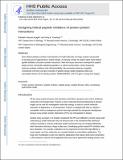Designing helical peptide inhibitors of protein–protein interactions
Author(s)
Rezaei Araghi, Raheleh; Keating, Amy E.
Downloadnihms844713.pdf (795.9Kb)
PUBLISHER_CC
Publisher with Creative Commons License
Creative Commons Attribution
Terms of use
Metadata
Show full item recordAbstract
Short helical peptides combine characteristics of small molecules and large proteins and provide an exciting area of opportunity in protein design. A growing number of studies report novel helical peptide inhibitors of protein-protein interactions. New techniques have been developed for peptide design and for chemically stabilizing peptides in a helical conformation, which frequently improves protease resistance and cell permeability. We summarize advances in peptide crosslinking chemistry and give examples of peptide design studies targeting coiled-coil transcription factors, Bcl-2 family proteins, MDM2/MDMX, and HIV gp41, among other targets.
Date issued
2016-04Department
Massachusetts Institute of Technology. Department of Biological Engineering; Massachusetts Institute of Technology. Department of BiologyJournal
Current Opinion in Structural Biology
Publisher
Elsevier
Citation
Rezaei Araghi, Raheleh, and Amy E Keating. “Designing Helical Peptide Inhibitors of Protein–protein Interactions.” Current Opinion in Structural Biology 39 (August 2016): 27–38 © 2016 Published by Elsevier Ltd
Version: Author's final manuscript
ISSN
0959-440X